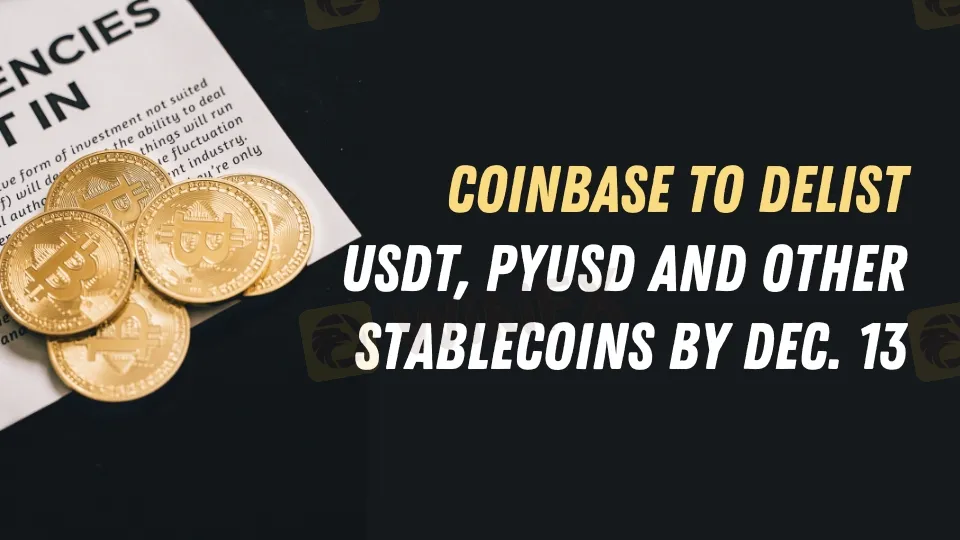简体中文
繁體中文
English
Pусский
日本語
ภาษาไทย
Tiếng Việt
Bahasa Indonesia
Español
हिन्दी
Filippiiniläinen
Français
Deutsch
Português
Türkçe
한국어
العربية
Coinbase to Delist USDT, PYUSD and Other Stablecoins by Dec. 13
Abstract:Coinbase Europe will delist USDT, PYUSD, and other stablecoins as part of MiCA's new regulations. Affects crypto users and exchanges in Europe ahead of the compliance deadline.

Coinbase and Other Exchanges to Delist USDT Before MiCA Deadline
On December 13, 2024, cryptocurrency exchanges around Europe, including Coinbase Europe, Coinbase Germany, and Coinbase Custody International, will delist numerous prominent stablecoins, including Tether's USDT. This decision is consistent with the implementation of the European Union's Markets in Crypto-Assets Regulation (MiCA), which requires stablecoin issuers to comply with tough new laws by the end of the year.
Delisted assets will include USDT, PAX, PYUSD, GUSD, GYEN, and DAI. Coinbase will, however, continue to offer MiCA-compliant stablecoins such as USD Coin (USDC) and the euro-backed EURC, which is a collaboration with Circle. Users who own non-compliant stablecoins should convert them to authorized alternatives before the delisting date.
Tether's Compliance with MiCA is Still in Question
One of the most important issues in this delisting process is the position of Tether's USDT. Although the European Securities and Markets Authority (ESMA) has yet to issue a formal verdict, Tether's compliance with MiCA is being investigated. Tether CEO Paolo Ardoino has questioned certain sections of the rule while reassuring the public that the business is working on solutions that fit European market standards.
Coinbase, the world's third-largest cryptocurrency exchange, handles more than $1 billion in USDT trading activity every day. The delisting of USDT on such a prominent platform is a watershed moment in the European crypto sector. Meanwhile, Tether has stopped its euro-backed stablecoin EURt in favor of supporting MiCA-compliant stablecoins such as EURq and USDq from Quantoz Payments.

Coinbases Compliance Strategy
Coinbase stated that it is committed to regulatory compliance. The exchange said that it will block access to European Economic Area (EEA) customers for stablecoins that do not fulfill MiCA criteria by December 30, 2024. This legal reform will have far-reaching consequences for cryptocurrency consumers and exchanges in the European market.
Impact of MiCA Regulations on Stablecoins
MiCA, which went into force in June 2024, requires all stablecoins in the EEA to obtain an e-money license from an EU member state. This might drive big coins, like as USDT, off exchanges like Coinbase unless they obtain the appropriate regulatory license. As the deadline approaches, other exchanges including OKX, Bitstamp, and Uphold have already begun to ban non-compliant stablecoins in anticipation of MiCA's complete implementation.
Binance's Plan to Limit Non-compliant Stablecoins
Meanwhile, Binance has hinted that it may limit the supply of noncompliant stablecoins in the European Union (EU). The exchange has warned that it may eventually delist stablecoins that are deemed “unregulated” by MiCA. Marina Parthuisot, head of legal at Binance France, identified the absence of authorized stablecoin projects in the region as a significant barrier. Existing stablecoins may be delisted in large numbers if there is no grace period.
MiCA: Europe's Bold Steps in Crypto Regulation
The MiCA legislation, which was finalized in June 2024, makes the European Union the first major jurisdiction to have complete cryptocurrency rules. This would enable exchanges and wallet providers to operate throughout the EU with a single license, considerably simplifying the process for businesses. However, the full consequences of MiCA, particularly for stablecoins and decentralized projects, are unknown, making it a key area of research for the whole cryptocurrency industry.
Final Thoughts
The MiCA compliance deadline of December 13 will likely alter the landscape of stablecoin adoption in Europe. As Coinbase and other big exchanges such as Binance react to the new legal climate, the status of USDT and other non-compliant stablecoins is uncertain. The continuing investigation into Tether's MiCA compliance underscores the issues that stablecoin issuers face in Europe. For cryptocurrency users, this serves as a wake-up call to ensure that their holdings are compliant with the new legislation, or they risk falling behind as exchanges clean up their offers in the coming months.

Disclaimer:
The views in this article only represent the author's personal views, and do not constitute investment advice on this platform. This platform does not guarantee the accuracy, completeness and timeliness of the information in the article, and will not be liable for any loss caused by the use of or reliance on the information in the article.
Read more

Russia to Fully Ban Crypto Mining in 10 Regions Starting January 1, 2025
Starting from January 1, 2025, Russia will implement a comprehensive ban on cryptocurrency mining in 10 regions for a period of six years. The ban will remain in effect until March 15, 2031.

Malaysia’s Crypto Landscape: Adapting Amidst Global Ambitions
The United States is intensifying its efforts to become a global cryptocurrency hub under President-elect Donald Trump. Experts believe this move could prompt countries, including Malaysia, to reassess their regulatory approaches toward digital assets.

SEC Approves Hashdex and Franklin Crypto ETFs on Nasdaq
The SEC has approved crypto index ETFs by Hashdex and Franklin Templeton, including Bitcoin and Ethereum, marking a milestone in crypto asset investment.

North Korean Hackers Steal $1.3bn in Cryptocurrency in 2024
Over $2.2bn in cryptocurrency stolen in 2024, with North Korean hackers accounting for $1.3bn. Discover how cyber theft impacts the evolving crypto landscape.
WikiFX Broker
Latest News
ASIC Sues Binance Australia Derivatives for Misclassifying Retail Clients
AIMS Broker Review
The Hidden Checklist: Five Unconventional Steps to Vet Your Broker
WikiFX Review: Is FxPro Reliable?
Malaysian-Thai Fraud Syndicate Dismantled, Millions in Losses Reported
Trading frauds topped the list of scams in India- Report Reveals
YAMARKETS' Jingle Bells Christmas Offer!
Doo Financial Expands Regulatory Reach with Offshore Licenses in BVI and Cayman Islands
Why is there so much exposure against PrimeX Capital?
Russia to Fully Ban Crypto Mining in 10 Regions Starting January 1, 2025
Currency Calculator


